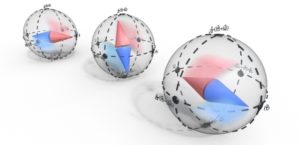 On Friday April 26th, we have the pleasure to welcome in SPINTEC Matthias OPEL from Walther-Meissner-Institute, Bavarian Academy of Sciences and Humanities, Garching, Germany. He will give us a seminar at 11:00 entitled :
On Friday April 26th, we have the pleasure to welcome in SPINTEC Matthias OPEL from Walther-Meissner-Institute, Bavarian Academy of Sciences and Humanities, Garching, Germany. He will give us a seminar at 11:00 entitled :
Magnon Spin Transport in Antiferromagnetic Insulators
Place : IRIG/SPINTEC, auditorium 445 CEA Building 10.05 (access to CEA requires an entry authorization. Request it before April 16th at admin.spintec@cea.fr)
video conference : https://webconf.cea.fr/johanna.fischer/0N4DZHN7
IF THE LINK DOES NOT WORK, try with skype web App : https://webconf.cea.fr/johanna.fischer/0N4DZHN7?sl=1
or by phone +33 1 69 35 55 10 conf ID : 8025611120
Abstract : Magnons are the quantized excitations of the spin system in magnetically ordered materials and offer a unique platform for future information technology. Antiferromagnets host pairs of spin-up and spin-down magnons. We describe them in terms of a magnonic pseudospin [1]. Its close analogy to the electronic spin led to the prediction of novel fascinating spin transport phenomena. The antiferromagnetic oxide α-Fe2O3 (hematite) harbors a finite anisotropic spin-spin (“Dzyaloshinskii-Moriya”) interaction with a slight canting of the sublattice magnetizations in the magnetic easy (0001) plane at room temperature, giving rise to a residual net magnetization [1,2]. Bilayers of epitaxial α-Fe2O3 and heavy metal Pt electrodes with a large spin-orbit coupling represent a prototypical system to investigate the spin-Hall magnetoresistance [2], as well as antiferromagnetic magnon propagation [1,3-5]. We study the spin transport in two-terminal devices and demonstrate the electrical magnon injection, diffusive magnon transport, and magnon detection. We observe the coherent precession of the magnonic pseudospin caused by the easy-plane anisotropy and the Dzyaloshinskii-Moriya interaction. By further applying an external magnetic field, we control this precession and interpret our observation as the magnonic analogue of the electronic Hanle effect [1,3]. It is found to behave non-reciprocally, since the precession frequency depends on the propagation direction [4]. The effect amplitudes are sensitive to the antiferromagnetic anisotropy [5]. Our findings unlock the high potential of antiferromagnetic magnonics towards the realization of electronics-inspired phenomena.
- Tobias Wimmer et al., Physical Review Letters 125, 247204 (2020).
- Johanna Fischer et al., Physical Review Applied 13, 014019 (2020).
- Janine Gückelhorn et al., Physical Review B 105, 094440 (2022).
- Janine Gückelhorn et al., Physical Review Letters 130, 216703 (2023).
- Monika Scheufele et al., APL Materials 11, 091115 (2023).
 Fig.: Illustration of the precession of the magnonic pseudospin (magnon Hanle effect)
Fig.: Illustration of the precession of the magnonic pseudospin (magnon Hanle effect)
Biography : Matthias OPEL studied physics at the Technical University of Munich (TUM), Germany. He received his diploma in the year 1995 with an experimental work on Raman spectroscopy in high-temperature (cuprate) superconductors, carried out at the Walther Meissner Institute in Garching (close to Munich). He continued this research as a PhD student and investigated the electronic system including phonon, magnon, and electron interactions in both superconducting and antiferromagnetic copper-oxide materials. He received his PhD in the year 2000. He then took a postdoc position at the same institute and switched his research topic from superconducting crystals to multifunctional oxide thin films and multilayers. In 2006, he became a permanent staff member (senior scientist). He is one of the leaders of the magnetism & spintronics group in the Walther Meissner Institute. His research interests are oxide electronics and antiferromagnetic spintronics.
The Walther Meissner Institute is part of the Bavarian Academy of Sciences and Humanities. Matthias is one of the four elected members of the Speaker Council of the Academy since 2015. He is also a member of the management board of the Walther Meissner Institute since 2016.




